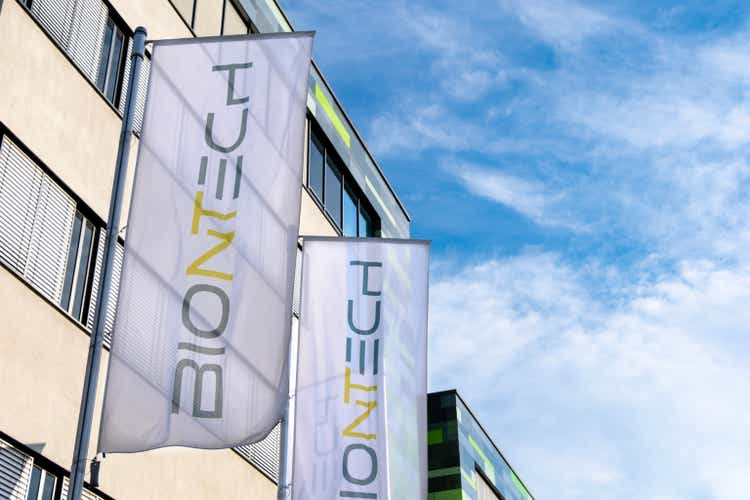
Victor Golmer/iStock Editorial via Getty Images
In 2021, with the COVID-19 pandemic in full swing, BioNTech (NASDAQ:BNTX) and Moderna (NASDAQ:MRNA) were the darlings of the pharma and biotech worlds. The two mRNA therapy developers created COVID vaccines with unprecedented speed, and the shots were deployed by the millions throughout the world.
Revenues for both companies shot through the roof, as did their stock prices. But three years later, times have changed dramatically for both companies.
On Aug. 9, 2021, BioNTech hit an all-time high of $441.35. On Oct. 17, it closed at $114.47, a 74% drop from that high. Moderna has fared even worse. The same day in 2021, Moderna reached its all-time high of $484.47. On Oct. 17, it closed at $54.82, a fall of ~89% from that high.
So, what accounts for the steep decline from the lofty highs of these mRNA therapy makers? Primarily, it has been a result of a steep drop in COVID vaccination rates. As the virus is no longer considered a pandemic and not seen as severe a threat in many parts of the world, many people are passing on the annual booster shots.
With this in mind, is the luster of mRNA companies like BioNTech and Moderna gone? Are they one-trick ponies who found tremendous success only with COVID vaccines? Is either one worth investing in?
The answer to these questions can possibly be found by looking at the two companies’ pipelines.
A look at BioNTech’s mid-stage mRNA pipeline and beyond shows that it is almost entirely devoted to oncology treatments. It has an influenza candidate in phase 3 that is also under examination in combination with its existing COVID vaccine. Both are in partnership with Pfizer (PFE).
BioNTech has several other mRNA candidates in the oncology space, but in earlier stages. It also has non-mRNA treatments in development — protein-based and cell therapies — mostly in oncology.
A key element of the German biotech’s pipeline is that it is not purely mRNA and is rather diversified. This could help the biotech going forward.
Many BioNTech observers point to BioNTech’s PM8002 (BNT327), a bispecific antibody combining PD-L1 checkpoint inhibition with VEGF-A neutralization. Data on the candidate, which is being developed with Biotheus, was presented at September’s European Society for Medical Oncology Congress in advanced non-small cell lung cancer, locally advanced/metastatic triple-negative breast cancer, and advanced renal cell carcinoma.
BioNTech recorded a sharp gain in September thanks to promising late-stage trial results from Summit Therapeutics’ (SMMT) ivonescimab against Merck’s (MRK) blockbuster Keytruda (pembrolizumab). PM8002/BN327 works similarly to ivonescimab.
While BioNTech (NASDAQ:BNTX) draws a hold from Seeking Alpha’s Quant Rating, SA Analyst Larry Ramer is bullish on the company, noting the company’s low valuation and strong pipeline.
Moderna’s outlook, in comparison, could be argued as decidedly less sanguine. The company’s stock price took a big hit in September after its R&D Day when it announced cuts to R&D funding and a pipeline shakeup.
Adding to the misery, Moderna (NASDAQ:MRNA) was the most-shorted healthcare stock in the S&P 500 in September, its third month in a row with that unfortunate distinction.
Unlike BioNTech, Moderna’s pipeline is nearly “all in” on mRNA assets. Most of them are infectious disease vaccines, particularly in COVID, flu, and RSV. It does have some mRNA vaccine candidates in oncology, as well as in rare diseases and other viruses.
During last month’s R&D Day, the company said that on an operating cash cost basis, it won’t break even until 2028. That’s two years later than previously planned.
SA’s Quant Rating rates Moderna a strong sell. The company, however, has its supporters. SA Analyst Denis Builovov, who gives Moderna a strong buy rating, says that while the stock has been sullied by weak revenue guidance, he is bullish given its next-generation COVID vaccine, the RSV vaccine, and other pipeline assets, such as cytomegalovirus and cancer vaccines.
Noah’s Arc Capital Management, with a strong sell rating, is urging investors to steer clear of Moderna. “Unfortunately for Moderna, [the R&D cuts come] at a time when other major drugmakers are starting to ramp up their R&D pipeline due to patent cliffs,” Noah’s Arc wrote in a recent article. “With lower R&D investments, I really think this seems counterproductive.”
